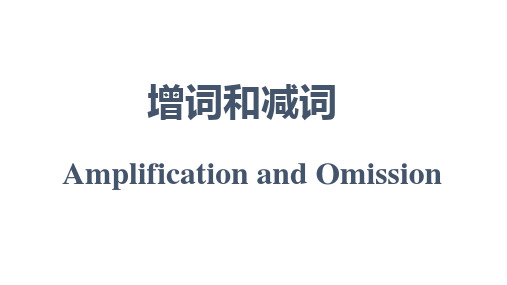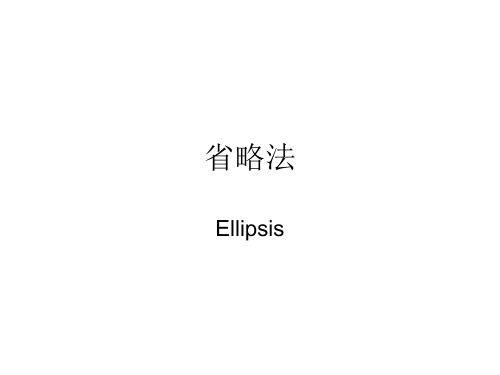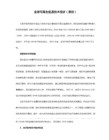翻译省略法
英语翻译技巧第十节 省略法

第十节省略法省略是删去一些可有可无的,或违背译文语言习惯的词。
一.从语法角度来看(一)省代词1.省略作主语的人称代词(1)英语中通常每句都有主语,如主语不变,译成汉语时不必重复。
1)He was thin and haggard and he looked miserable. 2)But it’s the way I am, and try as I might, I haven’t been able to change it.3)They had murdered his father, they had taken the best of him, they had crushed his whole family.4)Laura wished now that she was not holding that piece of bread-and-butter, but there was nowhere to put it and she couldn’t possibly throw it away.1)他消瘦而憔悴,()看上去很惨。
2)但我就是这个脾气,()虽然几经努力,()却未能改变过来。
3)他们害死了他的父亲,()榨干了他的精力,()毁了他的全家。
4)这时劳拉宁愿()手里没有这块涂上黄油的面包,拿着又没有地方放,()又不可能扔掉。
作业:1.I am 78 years old; I have been confined to my room with a paralytic stroke for the past 14 months.2. Like his friend he had many wonderful ideas, but he only put a few into practice.3. We can measure the amount of water in a pot, but we can’t measure its heat. We haven’t an instrument for that.4. The Grand Dukes always liked new ideas, and later they were good friends of Galileo.(2)泛指的英语人称代词作主语时,即使是第一个主语,汉译时也可省略。
第九讲 英语翻译技巧省略法

you like best. 4) They wanted to determine if he complied with the
terms of his employment and his obligations as an American. 5) Some have entered college and others have gone to the countryside. 6) Each country has its own customs. 7)把故事看完后,用你自己的话讲一遍。 8)我是在北京遇上他的。 9)天气寒冷,河都结冰了。 10)游客可以去杨贵妃洗澡的华清池洗温泉浴。
张伟红
1) Her room is always kept clean and tidy though she is busy all day.
尽管她整天忙忙碌碌, 她的房间却保持得干干净净,利利落落。
2) Jesse opened his eyes. They were filled with tears. 杰西睁开眼睛, 眼里充满了泪水。
1.省略某些重复词语 2.省略表示范畴的词语 3.省略可能影响译文修辞效果的词语
四、汉译英练习
张伟红
一、英汉翻译中的省略技巧
Eg.1)You can never tell who is right. 很难说谁对谁错。(省略人称代词) 2)Those who are in favor please hold up their hands. 赞成的请举手。(省略指示代词、关系代词和物主代词) 3)It’s necessary to develop our computer science at
翻译 省略法

Omission指省去那些在译文中不言而喻的字词,或省去那些译出来反而会显得突兀、累赘或不合汉语的表达习惯的词语。
(一)省略人称代词一般说来,英文的句法比汉语严格,每个句子一般都有完整的主谓宾。
而汉语的表达习惯则往往会在指代关系明确的情况下,几个谓语借用上下文提到一个共同的主语,不必一个个重复,因此,作主语及作宾语的人称代词汉译时往往会省略。
如:Give him an inch and he?ll take an ell.得寸进尺。
Follow the river and you will get to the sea.顺藤摸瓜。
(二)省略物主代词英语用物主代词多于汉语。
如:She puts on her clothes.她穿上衣服。
(三)省略非人称代词用来表示时间、天气、自然环境或距离的非人称代词it,用来代替不定式短语或从句作形式主语的先行代词it,和强调句式中的it,汉译时往往省略。
如:It was a cold morning of spring when I went to see her.我在一个寒冷的春天早晨去见她。
—What day is it today?—It is Saturday.—今天星期几?—星期六。
(四)省略并列连词,and和or如:This little room is warm and cosy.这个小房间温暖舒适。
She wentsintosthe room and closed the door.她走进房间,关上门。
All I am,or can be,I owe to my angel mother.我之所有,我之所能,都归功于我慈爱的母亲。
(五)省略从属连词汉语中的逻辑关系往往是隐含在句子含义中的,由语序加以体现。
因此,英语中一些表示原因、条件或时间的从属连词有时可省略。
如:Because everyone uses language to talk,everyone thinks he can talk about language.人人都用语言交谈,人人也就自认能够谈论语言。
英语翻译技巧第十节省略法

第十节省略法省略是删去一些可有可无的,或违背译文语言习惯的词.一.从语法角度来看(一)省代词1.省略作主语的人称代词(1)英语中通常每句都有主语,如主语不变,译成汉语时不必重复.1)He was thin and haggard and he looked miserable。
2)But it's the way I am, and try as I might,I haven’t been able to change it.3)They had murdered his father, they had taken the best of him, they had crushed his whole family。
4)Laura wished now that she was not holding that piece of bread—and-butter, but there was nowhere to put it and she couldn't possibly throw it away。
1)他消瘦而憔悴,()看上去很惨。
2)但我就是这个脾气,()虽然几经努力,()却未能改变过来。
3)他们害死了他的父亲,()榨干了他的精力,()毁了他的全家.4)这时劳拉宁愿()手里没有这块涂上黄油的面包,拿着又没有地方放,()又不可能扔掉.作业:1.I am 78 years old; I have been confined to my room witha paralytic stroke for the past 14 months.2. Like his friend he had many wonderful ideas, but he onlyput a few into practice。
3. We can measure the amount of water in a pot, but we can’t measure its heat. We haven’t an instrument for that。
英译汉翻译技巧省略法

英译汉翻译技巧省略法省略法(omission)是为了行文的简洁和更符合目的与习惯,将一些重复的词语或一些已被涵盖的意义省去的翻译方法,而原文的意义并未因此受到任何损失。
1.When she could no longer decide, she became depressed. Whenever Dwight picked up the baby to take him to his place or to the doctor’s for a checkup, she felt relief.她无法抉择,心情压抑,而前夫马赛一把孩子接走或是送到诊所接受检查她就会有一种轻松感。
2.Rupert with his flexible young knees sat in a hunch-and-crouch pose in imitation of the natives.鲁珀特年龄小,双膝柔韧,学着当地人的样子,弓背缩身地跪坐着。
3.Stainless steel possess good hardness and high strength.不锈钢硬度大,强度高。
4.Penicillin works by not allowing a bacterium to build its cell wall.青霉素的作用是不让细菌制造细胞壁。
5. This is the solid rocky bottom under the ooze and mud of the ocean floor.海底软泥和泥层下面是坚硬的岩石层。
6. There is a 30% increase of our installed capacity with this year.今年,我们的装机容量增加了 30%。
7.在工作中,我们必须避免犯不必要的的错误。
We must avoid making mistakes in our work.8.质子带阳电,电子带阴电,而中子既不带阳电也不带阴电。
英语翻译之省略法

• 如果知道频率,就可以求出波长。 • 根据汉语习惯,某些用作宾语或同位语的反身代 词可省略不译。 • Why do we feel cooler when we fan ourselves? • 扇扇子时,我们为什么感到凉快些? • ⑸省译动词 • ①谓语动词的省译。 • 谓语动词,是英语句中必不可少的成分。汉语则 不然,句中可以没有动词而直接用形容词、名词 或词组作谓语。所以,有些英语谓语动词汉译时 可以不译出,句子反而更为通顺有力。(了解汉 语这个特点,汉译英时,可把某些汉语中的形容 词、名词或词组译成动词。)
• 从语法和修辞的角度看,省略有下列几种情况: • ⑴省译冠词 • 英语中冠词用得很多,汉语中却没有冠词。汉译英时要 注意加上名词前面的冠词,而英译汉时,冠词往往可以 省译。 • 例:The rate of a chemical reaction is proportional to the concentration of the reacting substance. • 化学反应的速度和反应物的浓度成正比。 • The basic function of the triode is as an amplifier. • 三极管的基本功能是作电流放大器。 • ⑵省译介词 • 英语中,词与词的关系通常是用介词来表示的。而汉语 中,词与词的关系是通过语序和逻辑关系
省略法
Ellipsis
• 词的省译 (The methods of omitting the word’s number) • 词的省译或叫省略法,指的是原文中的有些词, 译时不译出来。译文中虽无其词,但已有其意, 或是属于不言而喻,译出来反倒累赘或是违背译 文的语言习惯。省略译法的目的是为了使译文简 明扼要、通顺。要特别注意,省略法不是,也不 能删去其中的内容。 • ⒈ 英译汉时的省译
翻译中省略法的处理

考虑语境:在应用省略法时,需要考虑语境,确保省略后的文本在语境中 仍然能够理解。
保持原文风格原则
尊重原文的语言 风格和表达方式
保持原文的修辞 手法和情感色彩
避免过度翻译, 尽量保持原文的 简洁性和流畅性
0 1
作用:省略法 可以避免翻译 后的文本过于 冗长,提高阅 读体验。
0 2
应用范围:省 略法适用于各 种类型的文本, 包括文学、科 技、商业等领 域。
0 3
注意事项:在 使用省略法时, 需要注意保持 原文的意思和 逻辑,避免产 生误解。
0 4
省略法的分类
完全省略:省略整个句子或段落 部分省略:省略句子中的某些成分,如主语、谓语、宾语等 隐含省略:通过上下文暗示省略的内容 结构省略:省略句子中的某些结构,如连词、介词等
0
0
0
0
1
2
3
4
保留关键词,省略重复信息
识别关键词:找出句 子中的主要信息,保
留关键部分
省略重复信息:删除 重复出现的词汇或短
语,保持句子简洁
调整语序:根据目标 语言的语法规则,调
整句子结构
确保准确性:在省略 过程中,确保翻译的
准确性和完整性
05
翻译中省略法的注意事 项
注意文化差异
在翻译过程中,要注意不 同文化之间的差异,避免 因文化差异导致的误解和
翻译中省略法的处理
,a click to unlimited possibilities
汇报人:
目录 /目录
01
翻译中省略法 的概念
02
翻译中省略法 的应用
商务英语翻译—增词与省略

中国同世界各国各地区的经济技术交流与合作广泛 开展。 China has engaged in extensive economic and technological exchanges and cooperation with other countries and regions.
二、原文中表示范畴的词
We might not make any headway with your offer.
本公司接受贵公司的报盘,但要求贵公司把装运期提前两个月。
We accept your offer, but demand that you advance the shipment by two months.
话不说。
He shrugged his shoulders, shook his head, cast up his eyes, but said nothing.
4.增加连词或关系代词
汉语中的词,词组和句子之间的关系往往通过上下文或语序来表
示,较少用连词或关系代词.而英语通常需要用连词关系代词来表明
增词和减词
Amplification and Omission
一、增词法(Amplification)
增词(译)法就是指在翻译时按照句法上的需要在
译文中增加一些原文中虽无但有其意的词。 增译的目的是为了更加忠实通顺地表达原文的内容,
而决不是无中生有地随意增加。
1.增补主语
汉语里无主语的句子相当多,汉译英时 常常要根据上下文的意思选择适当的代 词或名词补出主语。
之间的逻辑关系.因此汉译英时增补的情况很多.例:
酒令智昏
物极必反
• When • Once
wine is in, wit is out.
英语翻译之省略法

• He declined to amplify on the President’s statement, since he had not read the text.
• 他没有看到总统讲话的文本,不愿意加以发挥. • If I had known it,I would not have joined in it.早知
• 众所周知,重量是地球作用在物体上的引力。
• ③强调句中的it,本身无词义,省译。 • 例 : It is a man’s social being that
determines his thinking. • 是人们的社会存在,决定人们的思想。
• ⑺同义词或近义词的省译
• 英语中,特别是科技英语中,有些同义词 或近义词连在一起用,或者表示强调,使 意思更加明确,或者表示一个名称的不同 说法。英译汉时,往往只译其中的一个, 或把意思综合起来译即可。
• 例:When heated, gases act in exactly the same way as liquid acts.
• 气体受热时所发生的变化与液体完全一样。
• 在实践中,动词省译还见于下列两种情况: • •某些系动词,如be, become, get等,如以形容
词或介词短语作表语时,这类动词常可省译。
• 化学反应的速度和反应物的浓度成正比。
• The basic function of the triode is as an amplifier. • 三极管的基本功能是作电流放大器。 • ⑵省译介词
• 英语中,词与词的关系通常是用介词来表示的。而汉语 中,词与词的关系是通过语序和逻辑关系
• 来表示。所以,英译汉时,许多介词可省略不译。 比如,表示时间、地点的介词,译成汉语时出现 在句首的可省译。
高级英汉翻译之省译法ppt课件

11
Practice: Chinese wood oil a good (bad) sailor a goodman dry (wet) nurse bowel movements turn the tables a matter of great imporce be out with sb. to sit above (below) the salt worth one's salt to sleep late doesn't hold water
dead men
冗员
the outer man
人的外表
the inner man
人的灵魂
the odd man
投决定性一票的13人
省略法在汉英翻译中的运用
2、Omitting Words of Conceptual Category 这些都是人民内部矛盾问题。
All these are contradictions among the people. 她的朋友们听到她家中的困难情况后,都主动伸出援助
之手。
After her friends heard about her family difficulties, they offered her a helping hand. 3、Omitting Meticulous Description 花园里面是人间的乐园,有的是吃不了的的大米白面, 穿不完的绫罗绸缎,花不完的金银财宝。
英译汉翻译技巧——省略法

英译汉翻译技巧——省略法省略法(ellipsis)是英汉翻译中常用的一种技巧,指的是在翻译过程中,将原文中的一些成分或内容省略掉,不翻译出来,以达到简洁明了的效果。
省略法在英汉翻译中非常常用,因为两种语言在表达方式和结构上存在很大的差异,在进行翻译时,适当地运用省略法能够更符合汉语的表达习惯。
一、省略法的分类根据省略的内容和形式,省略法可分为语义省略和结构省略。
1.语义省略语义省略是指在翻译过程中,省略掉原文中的一些内容,但仍然保留了原文的意义。
这类省略可以通过上下文的推理和理解来补足。
例如,原文中的“Do you want some tea?”可以省略为“Want some tea?”这样的表达。
在进行翻译时,我们可以根据前后文的信息,推测出原文主语是“you”,并在翻译中省略掉这个主语,直接翻译为“想要喝点茶吗?”。
2.结构省略结构省略是指在翻译过程中,省略掉原文中的一些句法结构或成分,以便更符合汉语的表达习惯。
例如,原文中的“I'm going to the store, do you want anything?”可以省略为“I'm going to the store, want anything?”这样的表达。
在进行翻译时,我们可以省略掉原文中的助动词“do”和主语“you”,以达到更简洁的表达效果。
二、运用省略法的原则1.保持语意的完整性在运用省略法时,应尽量保持原文语意的完整性,避免省略导致语意不清或解释不明的情况发生。
例如,原文中的“I'm going shopping. See you later!”可以省略为“I'm going shopping. See you!”这样的表达。
虽然省略了“later”,但是通过上下文的推测,读者仍然能够理解原文的意思。
2.保持句子结构的完整性在运用省略法时,应尽量保持句子结构的完整性,避免省略导致句子结构混乱或文法错误的情况发生。
英汉翻译法5——省略法

2.2.3 省略法省略法也被称为减词法(pruning)。
跟增词法刚好相反,省略法是指把原文中有的词语省掉不译出来,但省掉的都是一些可有可无的或违背译语语言习惯的词,如实词众的代词、动词的省略,虚词中的冠词、介词和连词的省略等,目的是为了在忠实的基础上使译文更加简洁通顺。
一、由于语法差异而需要省略:1.代词的省略:英语中代词的使用频率远远高于汉语,根据实际情况有时需要把代词所指代的人或事物重复出来,而有时则可以直接省掉,有人称代词(主格或宾格),物主代词等。
例1.Order is order. We cannot complain, we cannot bargain, we cannot question and we cannot suggest changes.命令就是命令,不得抱怨,不得讨价还价,不得置疑,不得建议修改。
例2.One must make painstaking efforts before one can master a foreign language.要掌握一门外语非下苦功夫不可.例3.He put his hands in his pockets and then shrugged his shoulders.他把双手放进衣兜里,耸了耸肩。
例4. A person with nerve damage in the spinal cord can grasp objects when his or her forearms are activated by a device like this one.脊髓神经有损伤的人使用这样的装置后,前臂肌肉被激活,便能抓住东西。
2.It的省略:it作形式主语或宾语,强调句中的it,或表示自然现象、时间、地点、距离等的it常常可以省略。
例:P313.连接词的省略:英语是一种形合的语言,连接词使用较多;而汉语是一种意合的语言,上下文的关系往往是暗含的,所以原文的一些连接词常常可以省略。
翻译之省略法

I had many wonderful ideas, but I only put a few into practice.
我有很多美妙的想法,但是只把少数付诸实践了。
He was thin and haggard and he looked miserable.
他瘦弱憔悴,看上去一副可怜相。
翻译之省略法.txt我这辈子只有两件事不会:这也不会,那也不会。人家有的是背景,而我有的是背影。 肉的理想,白菜的命。肉的理想,白菜的命。白马啊 你死去哪了!是不是你把王子弄丢了不敢来见我了。 一、从语法角度来看
(一)省代词
1.省略作主语的人称代词
(1)省略作主语的人称代词
冬天来了,春天还会远吗?(省略表示条件的连接词)
If I had known it, I would not have joined in to.
早知如此,我就不参加了。(省略表示条件的连接词)
John rose gloomily as the train stopped, for he was thinking of his ailing mother.
火车停了,约翰郁郁地站了起来,因为他想起了病中的母亲。(省略表示时间的连接词)
(四)省略冠词
1.英语有冠词,汉语没有冠词;因此,英译汉时往往可将冠词省略。
A teacher should have patience in his work.
当教员的应当有耐心。(省略不定冠词A)
The horse is a useful animal.
马是有益的动物。(省略定完词The)
It is out of the question to fly to the moon in the past.
英译汉翻译技巧-省略法

详细描述
省略冗余细节
在翻译过程中,对于不影响整体意义表达的不必要修饰,可以进行适当的省略。
总结词
在英语中,作者有时会使用一些修辞手法或表达方式来增强语言的艺术性和感染力。但在汉语中,这些修辞手法可能并不常见或被认为是不必要的修饰。因此,在翻译时可以选择省略这些不必要修饰,以保持译文的自然流畅。例如,英文原文中的比喻、拟人等修辞手法在中文中可能并不需要保留,可以直接省略或替换为更符合中文表达习惯的表述方式。
译者应注重提高自己的阅读和理解能力,准确把握原文的意义和风格,避免因理解错误而导致省略不当。
对译者的建议
THANKS FOR
WATCHING
感谢您的观看
Байду номын сангаас
句子层面实例分析
在句子层面,省略法还可以用于去除冗余表达,使译文更加精炼。
总结词
英语句子中有时会出现冗余的表达,如多余的修饰语、重复的修饰成分等。在翻译成汉语时,为了使句子更加精炼有力,可以选择省略这些冗余表达,只保留核心信息。例如,英语中的"very"可以省略不译,以使译文更加简洁明了。
详细描述
宾语是句子中重要的信息载体之一,但在某些情况下,省略宾语可以使句子更加简洁明了。
总结词
在翻译过程中,如果英语原句的宾语在上下文中已经明确,或者宾语对于句子的意义不是关键要素,可以考虑省略宾语,使译文更加流畅自然。
详细描述
省略宾语
总结词
除了主语、谓语和宾语之外,英语句子中还可能包含其他成分,如定语、状语、补语等。在翻译过程中,这些成分也可以根据需要进行省略。
冗余信息的省略
英文中有时会有一些冗余的词语或句子,这些在中文中并不需要翻译出来,可以直接省略。
英汉翻译之省略法

How much money are there in the purse that
you lost?
There is no getting along with him.
Warm-up Activity
(For your reference) 没“有”!
从前,海边一个村子里住着一位老渔夫。 山洞前长着一棵高大的松树。 车来了。 教室里的椅子刚好够坐。 你丢的钱包里还剩多少钱? 他这个人很难相处。
一般我们会说: 他进来那会儿我正在吃饭。或者, 我正吃饭,他进来了。
Warm-up Activity
把when译成“当……的时候”,不仅不符合 汉语的习惯,还给人一种“拖着一条尾巴” 的感觉。因此,我们在翻译的过程中要想办 法割掉这个尾巴,即把when省去不译。 比如:
When he saw me, he was startled. 他看见我,吓了一大跳。 (当他看见我的时候,他吓了一大跳。)
Warm-up Activity
该不该割掉这条尾巴?
关于 when 的翻译
Warm-up Activity
英译汉时,我们通常会用“当……的时候”来 翻译以when引导的状语从句。但在汉语中这个 结构用得并不普遍,尤其是在口语中。没有 I was having dinner.)
Warm-up Activity
There be 句型的翻译
--- “到底有还是没有?” --- “这个可以有!” --- “这个真没有!”
Warm-up Activity
“有” 还是没“有”?这是个问题!
There be 句型在英语中用的比较广泛。在英语 中,表示什么地点或存在什么事物时,常用 “there be + 名词 + 地点(时间)状语”的结 构。这种结构中的引导词“there be”本身没有 意义,相当于汉语的“有”。但在实际的翻译 过程中,究竟是翻译出“有”好,还是没“有 ”好呢?
英汉翻译之省略法

广告中有时会出现一些夸张的表达或修辞手法,为了使译文更加自然流畅,可以适当省略或简化。例 如,“The car provides the ultimate driving experience”可以简化为“极致驾驶体验”,以更符 合中文的表达习惯。
文学作品类文本的省略法应用
文学作品的语言通常比较丰富和细腻,因此 在英汉翻译文学作品时,可以根据目标读者 的阅读习惯和审美需求,适当省略一些细节 或冗余的描写。例如,“She walked slowly through the streets, her heart heavy with sorrow”可以简化为“她缓缓 地穿过街道,心怀悲伤”,以更符合中文的 表达方式。
英汉翻译之省略法
contents
目录
• 省略法概述 • 省略法在英汉翻译中的应用 • 省略法在英汉翻译中的注意事项 • 省略法在英汉翻译中的实践案例 • 总结与展望
01
CATALOGUE
省略法概述
定义
省略法是指在英汉翻译过程中,为了 使译文更加流畅、自然,对原文中的 某些词语、句子或表达进行省略的处 理方法。
广告类文本的省略法应用
广告语言通常追求创意和吸引力,因此在英汉翻译广告时,可以根据目标受众的文化背景和语言习惯 ,适当省略一些不必要的信息或冗余的表达。例如,“The product is made from the finest ingredients”可以简化为“精选原料,品质保证”,以更符合中文广告的语言风格。
- 1、下载文档前请自行甄别文档内容的完整性,平台不提供额外的编辑、内容补充、找答案等附加服务。
- 2、"仅部分预览"的文档,不可在线预览部分如存在完整性等问题,可反馈申请退款(可完整预览的文档不适用该条件!)。
- 3、如文档侵犯您的权益,请联系客服反馈,我们会尽快为您处理(人工客服工作时间:9:00-18:30)。
eg: You must excuse me, I shall not speak of the matter again. 请你原谅,我以后不再提这事了。
eg: In fact he showed quite clearly that the Copernican ideas were correct. But he did not say openly that he accepted them. 事实上,他相当清楚地表明,哥白尼的学说是正确的; 只是他没有公开宣布接受。
• (2)英译汉时,省略原文中的冠词是一般情况。 但在某些场合,冠词却不能省略。 • He left without saying a word. • 他一句话不说就走了。(不定冠词a或an指“一” 时,不能省) • The child are of an age. • 这些孩子都是同岁。 • The onlooker saw the little party climb ashore. • 看得人只见那一小队人爬上岸去。 • This is the book you wanted. • 这就是你想要的那本书。
3.省略物主代词
英语中的物主代词,汉译时往往可以省略,例 如 I wash my face in the morning,汉语只需说 “我早上洗脸”,而不必说“我早上洗我的脸”。 eg: She went, with her neat figure, and her sober womanly step, down the dark street. 她顺着黑暗的街道走去,显出利落匀称的身材, 迈着端庄的女人的步子。
eg: He shrugged his shoulders, shook his head, cast up his eyes, but said nothing. 他耸耸(‧‧‧‧‧‧)肩,摇摇(‧‧‧‧‧‧)头,(‧‧‧‧‧‧)两 眼看天,一句话不说。
eg: They pride themselves on their independence, their right to make up their own minds. 他们为能(‧‧‧‧‧‧)独立行事,为(‧‧‧‧‧‧)有权作出自 己的决定而感到自豪。
eg: We live and learn. (‧‧‧‧‧‧)活到老,学到老。
eg: You can never tell. (‧‧‧‧‧‧)很难说。
eg: Even as the doctor was recommending rest, he knew that this in itself was not enough, that one could never get real rest without a peacefu mind. 尽管医生建议休息,但他也知道休息本身是不够的, 如果心情不平静,(‧‧‧‧‧‧)是休息不好的。
• • • • • If winter comes, can spring be far behind? 冬天来了,春天还会远吗? If I had known it, I would not have joined in it. 早知如此,我就不参加了。 If you write to him, the response would be absolute silence and void. • 你给他写信永远都是石沉大海。
省略法Omission
省略是指原文中有些词在译文中不译出来,因 为译文中虽无其词而已有其意,或者在译文中 是不言而喻的。换言之,省略是删去一下可有 可无的,或者有了反嫌累赘或违背译文语言习 惯的词。但省略并不是把原文的某些思想内容 删去。现从语法角度和修辞角度分别举例探讨 省略法。
从语法的角度看
• • • • • 省代词 省略非人称的或强调句中的it 省略连接词 省略冠词 省略前置词
eg: It is in the plant that we work together with the workers. 就是在这个工厂内,我们同工人一起劳动。 eg: It is only shallow people who judge by appearances. 只有浅薄的人才会以貌取人。
(三)省略连接词
汉语词语之间连接词用的不多,其上下逻辑关系常、 常是暗含的,由词语的次序来表示。英语则不然, 连接词用得比较多。因此英译汉时在很多情况下可 不必把连接词译出来。
1.省略并列连接词
eg: He looks gloomy and troubled.
他看上去有些忧愁不安。
eg: Despite the privation, and the mounting toll of dead and wounded, however, morale remained intact, and people still in the street. 尽管供应不足,伤亡不断增加,然而士气并未 受到影响。街上,人们依然脸有笑容。
eg: The average American changes his or her job nine or ten times during his or her working life. 普通美国人(‧‧‧‧‧‧)一生中至少要换九到十次 (‧‧‧‧‧‧)工作。
(二)省略非人称的或强调句中的it
(一)省代词
1.省略做主语的人称代词
(1)根据汉语习惯,前句出现一个主语, 后句如仍为同一主语,就不必重复出现。 英语中通常每句都有主语,因此人称代词 做主语往往多次出现,这种人称代词汉译 时常常可以省略。
eg: He was thin and haggard and he looked miserable. 他消瘦而憔悴,(‧‧‧‧‧‧)看上去一副可怜相 eg: Laura wished now that she was not holding that piece of bread-and-butter, but there was nowhere to put it and she couldn't possibly throw it away. 这时劳拉宁愿(‧‧‧‧‧‧‧)手里没有这块涂上黄油的面 包, 拿着又没有地方放,(‧‧‧‧‧‧)又不可能扔掉。
• When I said nothing was wrong, my mother answered, “You are my daughter, when something is bothering you, I feel it too.” • 我跟她说一切正常,母亲回答道:“你是我女儿, 你有烦心事,我也能感觉到”。
(四)省略冠词
• (1) 英语有冠词,汉语没有冠词;因此,英译汉时往往 可将冠词省略。 • A teacher should have patience in his work. • 当教员的应当有耐心。(省略表示类别的不定冠词A) • The moon was slowly rising above the sea. • 月亮慢慢从海上升起。(省略表示独一无二的事物的 定冠词The) • It is out of the question to fly to the moon in the past. • 在过去,飞往月球是绝对办不到的事情。
eg: An animal is depentent on the oxygen which he inhales for his very existence. 动物离不开氧气,因为要生存(‧‧‧‧‧‧)就必须吸入氧 气。
(2)泛指的英语人称代词做主语时,即使是 做第一个主语,译文中往往也可以省略。
• The sky was blue and the sun was shining. • 天空是蓝色的,太阳正照耀着。 • The proletariat and the peasantry must unite. • 无产阶级和农民阶级必须联合起来。(省略表示阶级 的定冠词The) • The war escalated, on the ground, in the air, and at sea. • 战争在地面、空中以及海上全面升级。
2.省略从属连词
(1)省略表示原因的连词
英语因果句中一般用连接词表示原因,而汉语则往往 通过词序先后来表示因果关系,“因”在前,“果” 在后。因此,英译汉时往往可以把原文中这种连接 词省掉不译。 eg: We knew spring was coming as (because) we had seen a robin. 我们看见了一只知更鸟,知道春天快要到了。 As it is late, you had better go home. 时间不早了,你最好回家去吧。
• (3)省略表示时间的连词 • 表示时间关系的when和as等,汉译时一般用 “当……时”,或仅用“时”。但如汉语时 间先后次序明显,为了简略起见,“当…… 时”或“时”往往可以省略。
• When at last he stood upon the bluff, he turned to his little sister and looked upon her sorrowfully. • 最后他站到了悬崖上,转过身来,犹豫地看着他的 妹妹。 • Sunday is the day when I am least busy. • 周日我最闲。
2.强调用it
eg: It was with some difficulty that he found the way to his own house. 他费了不少劲儿才找到了回家的路。
eg: It was only then that I began to have doubts whather my story would ever be told. 只是在这个时候,我才开始怀疑,我的经历究竟 能不能公之于众呢!
it也是一种代词,但这里主要是讲它的两 种特殊用法,即非人称用和强调用。英语 中这样用的it,汉译时往往可以省略不译。
